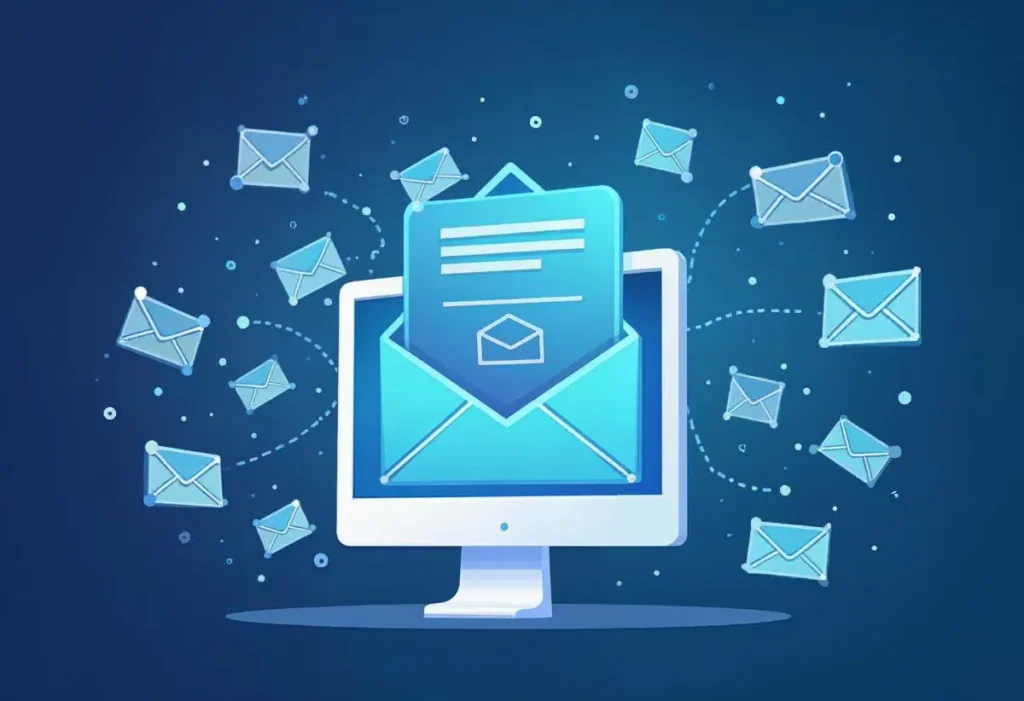Introduction: The power of AI in email marketing
Many businesses are eager to boost their email marketing revenue. But struggle due to stiff competition, ever-increasing customer expectations, and rising costs. Traditional email marketing techniques alone often fail to break through this noise.
However, artificial intelligence (AI) offers a powerful solution for brands looking to use AI to skyrocket email marketing revenue.
By leveraging AI, businesses can:
- boost revenue
- optimize marketing spend
- and deliver highly personalized experiences
These are what keep customers engaged and coming back for more.
This is important because email marketing remains a foundational strategy for driving revenue, offering an impressive average return of $42 for every dollar spent.
For those new to email marketing, consider exploring this step-by-step guide on what makes email marketing so effective. The guide will also teach you how AI transforms traditional methods.
Why AI is essential in today’s marketing landscape

AI as a competitive advantage: According to a Salesforce Report, 75 percent of marketers are either testing or fully implementing AI. This makes AI one of the top priorities—and challenges—in modern marketing.
AI is more than a trend. It’s a strategic advantage that allows companies to forge deeper connections with their audiences. As well as it allows the marketing team to maximize their marketing budgets.
The adoption of AI means brands can analyze large data sets in seconds, gaining insights into customer preferences, behaviors, and needs.

For instance, franchises face a unique challenge in scaling personalized marketing across multiple locations while maintaining a consistent brand voice.
AI-powered solutions help these businesses adapt their messages to specific local markets and demographics without losing sight of brand cohesion.
Integrating AI in email marketing provides the following advantages:
- Enhanced targeting of customer segments
- Increased engagement through data-driven personalization
- Budget efficiency, focusing spend where it’s most effective
By leveraging AI, companies ensure their marketing efforts resonate with each customer. And campaigns that resonate serve to create a foundation for higher returns on investment.
Hyper-personalization on a whole new level using AI

Today’s customers demand emails tailored to their unique preferences, buying behaviors, and ideal timing.
AI-powered personalization has proven highly effective, yielding a 200 percent increase in click-through rates and up to 90 percent increase in email-driven revenue.
Through AI, businesses can analyze customer data at scale. This enables the creation of highly targeted and relevant content for every individual subscriber.
Platforms like DailyStory provide advanced segmentation capabilities. This approach enables businesses to send personalized product recommendations, promotions, and content that aligns with each recipient’s specific journey.
With AI-driven personalization, companies can achieve up to a 150 percent increase in open rates. An increase in open rates, drive more conversions by giving each customer a uniquely tailored experience.
If you’re interested in how this process works, check out these eight ways AI can be applied in email marketing. Our article will show you how advanced segmentation can deliver dynamic, hyper-relevant messages to individual customers.

A clothing retailer used AI-powered segmentation in their campaigns. They used it to recommend products based on past purchases. By sending timely promotions that match each customer’s preferences and seasonal shopping patterns, they were able to increase ROI.
AI-driven predictive analytics – no more guesswork in email campaigns

Predictive analytics is a game-changer for email marketing. It removes the guesswork and allows brands to anticipate customer behaviors and engage proactively.
Studies indicate that AI-driven predictive analytics can improve email open rates by 25 percent and yield up to a 7 percent conversion rate in re-engagement campaigns.
With predictive AI, brands can:
- Optimize send times based on when individual customers are most likely to open emails
- Recommend products using behavioral patterns and purchase history
- Re-engage dormant customers by offering special incentives or personalized offers
For optimal results, consider building a custom GPT model tailored to your email marketing needs, aligning AI with your brand’s unique voice and goals.
A custom GPT can align AI with your specific brand tone and goals, leading to even greater accuracy in predicting customer behaviors.
Beauty Brand Example

A beauty brand uses predictive analytics to identify customers at risk of churning.
By sending them exclusive, personalized discounts, they re-engage previously inactive subscribers, ultimately driving new sales while reducing churn.
Automated optimization – save time and boost ROI using AI

One of the most powerful aspects of AI in email marketing is its ability to automate optimization processes, from A/B testing to performance monitoring.
AI-driven optimization has led to as much as a 300 percent increase in email ROI, according to a study by Influencer Marketing Hub, as it allows marketers to test and refine their campaigns more efficiently than ever before.
AI enables marketers to:
- Automate A/B testing for subject lines, layouts, and send times
- Continuously monitor performance, making real-time adjustments
- Analyze engagement metrics instantly, optimizing future campaigns for higher ROI
As noted in How Franchises Can Use AI in Email Marketing, franchises benefit significantly from AI-powered optimization. They benefit because it allows them to adapt campaigns based on real-time data without constant manual input. That ensures each campaign performs to its highest potential across various markets.
With automated AI tools, marketers can save countless hours of manual testing and analysis, all while improving campaign effectiveness.
Building trust through data-driven AI

As businesses adopt AI, customers increasingly expect transparency and security in data usage.
According to a recent Salesforce Report, 68 percent of consumers believe that companies must prioritize trust in the context of AI adoption.
By responsibly managing customer data, brands can balance the advantages of personalization with the need for data privacy and trust.
Platforms like DailyStory emphasize data security and ethical use, ensuring businesses can personalize content without compromising customer trust.
By fostering transparency and adhering to security best practices, companies can build lasting customer loyalty and differentiate themselves as responsible brands.

Consider a financial services provider. They used AI-driven personalization. This allowed them to communicate data handling policies to their subscribers clearly. As a result, they were able to foster both engagement and trust. This goes a long way with customers and helps them grow their market share.
Conclusion: Embrace AI to transform your email marketing strategy
AI offers transformative potential for businesses looking to enhance their email marketing strategies.
By leveraging AI, companies can boost revenue, increase engagement, and save valuable time.
In a highly competitive market, AI offers massive benefits. The benefits AI offers are hyper-personalization, predictive insights, automated optimization, and enhanced trust. These benefits enable companies to deliver on their brand promise effectively while driving stronger engagement and higher ROI.
For those interested in a deep dive into specific AI techniques, explore these eight powerful ways AI enhances email marketing, covering topics from deliverability to retargeting.
Frequently Asked Questions about AI Email Marketing
Below are some frequently asked questions about how AI can improve email marketing capabilities.
How does AI improve email marketing revenue?
- AI improves email marketing revenue by automating processes, leveraging predictive analytics, and enabling data-driven email marketing strategies. It helps optimize delivery times, subject lines, and content to drive higher open rates and customer engagement, ultimately increasing revenue.
What is hyper-personalization in email marketing?
- Hyper-personalization, powered by artificial intelligence in marketing, involves analyzing customer data to create personalized email campaigns. This includes tailored product recommendations, customized promotions, and content that aligns with individual preferences and behaviors, resulting in higher click-through rates and conversions.
Can small businesses benefit from AI in email marketing?
- Absolutely. AI tools for email marketing automation are scalable and accessible to small businesses. They streamline tasks like segmentation, behavioral analytics, and content personalization, helping small businesses increase their email marketing ROI and save time.
What is predictive analytics, and how does it help email marketing?
- Predictive analytics uses machine learning in marketing to anticipate customer behaviors based on historical data. It helps optimize send times, suggest relevant products, and re-engage inactive customers, resulting in increased open rates and revenue from AI-powered email campaigns.
Is it hard to implement AI in email marketing?
- Many tools for AI email marketing offer user-friendly interfaces and detailed tutorials, making implementation straightforward.
How does AI ensure data security in email marketing?
- AI ensures data security by identifying vulnerabilities and automating compliance with privacy regulations. Using NLP for email marketing, businesses can also detect risks in real-time while maintaining transparency to build customer trust.
Can AI help with email deliverability?
- Yes, AI enhances email deliverability optimization by maintaining clean email lists, avoiding spam traps, and managing automated email workflows to ensure emails land in the inbox rather than spam folders.
Does AI replace human creativity in email marketing?
- AI doesn’t replace human creativity but enhances it. While AI handles data-driven email marketing tasks like segmentation and optimization, marketers can focus on crafting compelling messages that resonate emotionally with their audience.
What are the key metrics to track in AI-powered email marketing?
- Important metrics include open rates, click-through rates, conversion rates, bounce rates, and ROI. AI tools provide detailed insights into these metrics, helping marketers refine AI-powered email campaigns for maximum impact.

